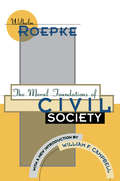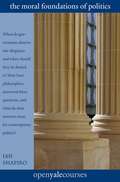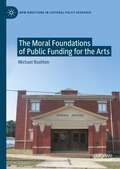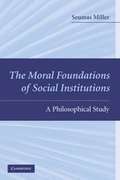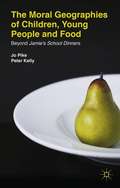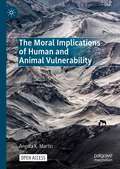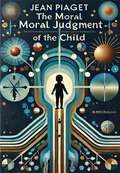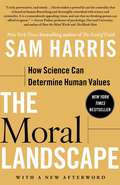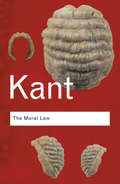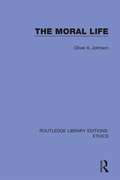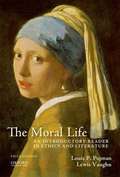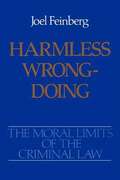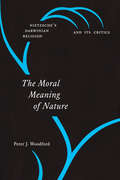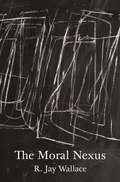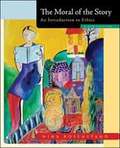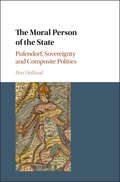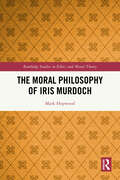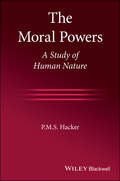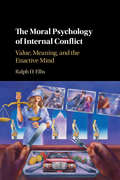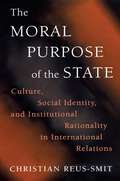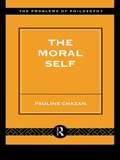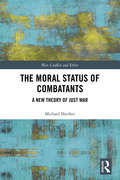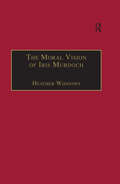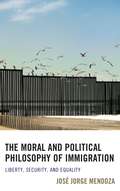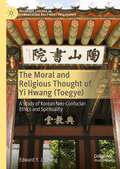- Table View
- List View
The Moral Foundations of Civil Society
by Wilhelm RoepkeWilhelm Roepke may have been the soundest economist of the twentieth century. He understood the limitations as well as the strengths of his discipline. Economists are often tempted to take the easy way out, by denying reality to aspects of human existence and reducing them to arbitrary and subjective tastes and preferences. Roepke never does this, and this is his strength. He realizes that all of these are legitimate aspects of human experience which must be satisfied in a balanced and harmonious social existence. Nature, sex, religion, beauty, and politics are all meaningful as parts of the whole. Problems occur only when each segment attempts to become the whole.The original title of this book, Civitas Humana, contains a double meaning. It promises a treatment of questions fundamental not only to human society but also to humane society. The volume combines distinct aspects of life. Half of the book is devoted to questions of economic and social life. The other half examines spiritual and national life. Chapters include Moral Foundations, The Place of Science in the City of Man, Counterweights to the State, Congestion and Proletarianisation of Society, and Economic System and International New Order.Although Roepke recognized the validity of the nation in the modern world, he was constantly trying to find the smaller agencies within society in which real allegiances and loyalties were to be developed. His ideas continue to be of significance. As described by William F. Campbell in the new introduction, The Moral Foundations of Civil Society is a necessary addition to the libraries of economists, sociologists, theologians, and philosophers.
The Moral Foundations of Politics
by Ian ShapiroWhen do governments merit our allegiance, and when should they be denied it? Ian Shapiro explores this most enduring of political dilemmas in this innovative and engaging book. <P><P> Building on his highly popular Yale courses, Professor Shapiro evaluates the main contending accounts of the sources of political legitimacy. Starting with theorists of the Enlightenment, he examines the arguments put forward by utilitarians, Marxists, and theorists of the social contract. Next he turns to the anti-Enlightenment tradition that stretches from Edmund Burke to contemporary post-modernists. In the last part of the book Shapiro examines partisans and critics of democracy from Plato's time until our own. He concludes with an assessment of democracy's strengths and limitations as the font of political legitimacy. The book offers a lucid and accessible introduction to urgent ongoing conversations about the sources of political allegiance.
The Moral Foundations of Public Funding for the Arts (New Directions in Cultural Policy Research)
by Michael RushtonThis book provides a detailed account, and critique, of diverse approaches to the arts funding question, with a focus on the arm’s length arts councils that are the norm in the Anglo-American world. It builds on economic methods, the liberal-egalitarian framework of John Rawls, the communitarian opposition to the liberal framework, the capabilities approach to equality, and the cultural conservatism of Roger Scruton and others. In each case, the book considers the very practical aspect of public funding of the arts, namely, what are the implications for what ought to receive priority, and what parts of the cultural world are best left to their own, private sector, devices. It is not a work of “arts advocacy”. Rather, the book challenges assumptions, and sparks critical debate in the field.
The Moral Foundations of Social Institutions
by Seumas MillerIn this book, Seumas Miller examines the moral foundations of contemporary social institutions. Offering an original general theory of social institutions, he posits that all social institutions exist to realize various collective ends, indeed, to produce collective goods. He analyses key concepts such as collective responsibility and institutional corruption. Miller also provides distinctive special theories of particular institutions, including governments, welfare agencies, universities, police organizations, business corporations, and communications and information technology entities. These theories are philosophical and, thus, foundational and synoptic in character. They are normative accounts of a sampling of contemporary social institutions, not descriptive accounts of all social institutions, both past and present. Miller also addresses various ethical challenges confronting contemporary institutional designers and policymakers, including the renovation of the international financial system, the 'dumbing down' of the media, the challenge of world poverty, and human rights infringements by security agencies combating global terrorism.
The Moral Geographies of Children, Young People and Food
by Peter Kelly Jo PikeThis book takes Jamie Oliver's campaign for better school meals as a starting point for thinking about morally charged concerns relating to young people's nutrition, health and well-being, parenting, and public health 'crises' such as obesity. The authors show how these debates are always about the moral project of the self.
The Moral Implications of Human and Animal Vulnerability
by Angela K. MartinIn this open access book, Angela K. Martin thoroughly addresses what human and animal vulnerability are, how and why they matter from a moral point of view, and how they compare to each other. By first defining universal and situational human vulnerability, Martin lays the groundwork for investigating whether sentient nonhuman animals can also qualify as vulnerable beings. She then takes a closer look at three different contexts of animal vulnerability: animals used as a source of food, animals used in research, and the fate of wild animals.
The Moral Judgment of the Child
by Jean Piaget"The Moral Judgment of the Child" by Jean Piaget is a seminal work in the field of developmental psychology, offering profound insights into how children develop moral reasoning. Piaget, a pioneering psychologist, meticulously examines the stages of moral development from early childhood through adolescence, providing a comprehensive framework for understanding how children distinguish right from wrong.In this influential book, Piaget presents his groundbreaking research based on extensive observations and interviews with children. He explores how children's moral thinking evolves, focusing on the transition from a heteronomous morality, where rules are imposed by authority figures and viewed as unchangeable, to an autonomous morality, where children develop their own sense of justice and fairness based on mutual respect and cooperation.Piaget identifies key factors that influence moral development, such as peer interactions, play, and the child's growing cognitive abilities. He delves into the concepts of intention and consequence, illustrating how children's understanding of these aspects shifts with age and experience. Through detailed case studies and examples, Piaget demonstrates the complexity and variability of moral judgment across different developmental stages."The Moral Judgment of the Child" challenges traditional views of moral development, emphasizing the active role of the child in constructing moral understanding through social interactions and cognitive growth. Piaget's theory has profound implications for education, parenting, and our broader understanding of human development.This book is an essential resource for psychologists, educators, and anyone interested in the intricacies of moral development. Piaget's clear and engaging writing makes complex concepts accessible, while his rigorous research provides a solid foundation for further study. "The Moral Judgment of the Child" remains a cornerstone in developmental psychology, offering timeless insights into the moral lives of children.
The Moral Landscape: How Science Can Determine Human Values
by Sam HarrisNew York Times bestselling author Sam Harris&’s first book, The End of Faith, ignited a worldwide debate about the validity of religion. In the aftermath, Harris discovered that most people—from religious fundamentalists to non-believing scientists—agree on one point: science has nothing to say on the subject of human values. Indeed, our failure to address questions of meaning and morality through science has now become the primary justification for religious faith.In this highly controversial book, Sam Harris seeks to link morality to the rest of human knowledge. Defining morality in terms of human and animal well-being, Harris argues that science can do more than tell how we are; it can, in principle, tell us how we ought to be. In his view, moral relativism is simply false—and comes at an increasing cost to humanity. And the intrusions of religion into the sphere of human values can be finally repelled: for just as there is no such thing as Christian physics or Muslim algebra, there can be no Christian or Muslim morality. Using his expertise in philosophy and neuroscience, along with his experience on the front lines of our “culture wars,” Harris delivers a game-changing book about the future of science and about the real basis of human cooperation.
The Moral Law: Groundwork of the Metaphysics of Morals
by Immanuel KantFew books have had as great an impact on intellectual history as Kant's The Moral Law. In its short compass one of the greatest minds in the history of philosophy attempts to identify the fundamental principle 'morality' that governs human action. Supported by a clear introduction and detailed summary of the argument, this is not only an essential text for students but also the perfect introduction for any reader who wishes to encounter at first hand the mind of one of the finest and most influential thinkers of all time.
The Moral Life
by Oliver JohnsonOriginally published in 1969, this book challenges the view among many 20th Century philosophers that no cogent arguments could be found capable of providing support for the normative pronouncements of practical morality. The book asserts that this conclusion is mistaken and the result of basic deficiencies endemic in the logical structure of traditional ethics. The volume develops an argument whose logical structure is quite different from the ways of reasoning that have dominated the history of Western ethics and which allows answers to such primary questions of practical morality such as ‘How ought we as moral beings to act?’
The Moral Life: An Introductory Reader in Ethics and Literature (Fifth Edition)
by Louis P. Pojman Lewis VaughnIdeal for introductory ethics courses, The Moral Life: An Introductory Reader in Ethics and Literature, Fifth Edition, brings together an extensive and varied collection of ninety-one classical and contemporary readings on ethical theory and practice. Integrating literature with philosophy inan innovative way, this unique anthology uses literary works to enliven and make concrete the ethical theory or applied issues addressed. It also emphasizes the personal dimension of ethics, which is often ignored or minimized in ethics anthologies. The readings are enhanced by chapterintroductions, study questions, suggestions for further reading, and biographical sketches. The fifth edition adds ten new readings, eight of which appear in two new chapters: Feminist Ethics and the Ethics of Care and Global Economic Justice. An updated Companion Website at www. oup. com/us/pojman provides self-quizzes, essay questions, and helpful links for students and reading summaries,a test bank, and PowerPoint-based lecture slides for instructors.
The Moral Limits of the Criminal Law: Harmless Wrongdoing (Volume Four)
by Joel FeinbergThe final volume of Feinberg's four-volume work, The Moral Limits of Criminal Law examines the philosophical basis for the criminalization of so-called "victimless crimes" such as ticket scalping, blackmail, consented-to exploitation of others, commercial fortune telling, and consensual sexual relations.
The Moral Meaning of Nature: Nietzsche’s Darwinian Religion and Its Critics
by Peter J. WoodfordWhat, if anything, does biological evolution tell us about the nature of religion, ethical values, or even the meaning and purpose of life? The Moral Meaning of Nature sheds new light on these enduring questions by examining the significance of an earlier—and unjustly neglected—discussion of Darwin in late nineteenth-century Germany. We start with Friedrich Nietzsche, whose writings staged one of the first confrontations with the Christian tradition using the resources of Darwinian thought. The lebensphilosophie, or “life-philosophy,” that arose from his engagement with evolutionary ideas drew responses from other influential thinkers, including Franz Overbeck, Georg Simmel, and Heinrich Rickert. These critics all offered cogent challenges to Nietzsche’s appropriation of the newly transforming biological sciences, his negotiation between science and religion, and his interpretation of the implications of Darwinian thought. They also each proposed alternative ways of making sense of Nietzsche’s unique question concerning the meaning of biological evolution “for life.” At the heart of the discussion were debates about the relation of facts and values, the place of divine purpose in the understanding of nonhuman and human agency, the concept of life, and the question of whether the sciences could offer resources to satisfy the human urge to discover sources of value in biological processes. The Moral Meaning of Nature focuses on the historical background of these questions, exposing the complex ways in which they recur in contemporary philosophical debate.
The Moral Nexus (Carl G. Hempel Lecture Series #15)
by R. Jay WallaceA new way of understanding the essence of moral obligationThe Moral Nexus develops and defends a new interpretation of morality—namely, as a set of requirements that connect agents normatively to other persons in a nexus of moral relations. According to this relational interpretation, moral demands are directed to other individuals, who have claims that the agent comply with these demands. Interpersonal morality, so conceived, is the domain of what we owe to each other, insofar as we are each persons with equal moral standing.The book offers an interpretative argument for the relational approach. Specifically, it highlights neglected advantages of this way of understanding the moral domain; explores important theoretical and practical presuppositions of relational moral duties; and considers the normative implications of understanding morality in relational terms.The book features a novel defense of the relational approach to morality, which emphasizes the special significance that moral requirements have, both for agents who are deliberating about what to do and for those who stand to be affected by their actions. The book argues that relational moral requirements can be understood to link us to all individuals whose interests render them vulnerable to our agency, regardless of whether they stand in any prior relationship to us. It also offers fresh accounts of some of the moral phenomena that have seemed to resist treatment in relational terms, showing that the relational interpretation is a viable framework for understanding our specific moral obligations to other people.
The Moral Of The Story: An Introduction To Ethics
by Nina RosenstandThe Moral of the Story, offers a remarkably effective approach that helps students understand and evaluate moral issues. Through storytelling and story analysis, using examples from fiction and film, Rosenstand brings classical moral theories to life and shows student how these theories are applied to the world around them. <P><P>The sixth edition of this text with readings has been thoroughly updated to include coverage of and examples from recent research, events, and films. It also expands the applied ethics chapter to include the additional topics of media bias, abortion, euthanasia, business ethics, and environmental ethics, in particular the issue of global warming.
The Moral Person of the State: Pufendorf, Sovereignty and Composite Polities
by Ben HollandThis is the first detailed study in any language of the single most influential theory of the modern state: Samuel von Pufendorf's account of the state as a 'moral person'. Ben Holland reconstructs the theological and political contexts in and for which Pufendorf conceived of the state as being a person. Pufendorf took up an early Christian conception of personality and a medieval conception of freedom in order to fashion a theory of the state appropriate to continental Europe, and which could head off some of the absolutist implications of a rival theory of state personality, that of Hobbes. The book traces the fate of the concept in the hands of others - international lawyers, moral philosophers and revolutionaries - until the early twentieth century. It will be essential reading for historians of political thought and for those interested in the development of key ideas in theology, international law and international relations.
The Moral Philosophy of Iris Murdoch (Routledge Studies in Ethics and Moral Theory)
by Mark HopwoodThe moral philosopher and novelist Iris Murdoch said that philosophy “is both the guide and mirror of the age”. In this wide-ranging book Mark Hopwood explores the significance of Murdoch's philosophy in the present day, paying particular attention to her account of the role of metaphor and imagery in moral reasoning. Hopwood argues that one of the main reasons Murdoch's work has often been neglected by mainstream moral philosophers is that she offered a radically different conception of what it means to do moral philosophy. Rather than seeking to establish a single systematic moral framework in the manner of utilitarian or Kantian theories, she argued that moral philosophers ought to be concerned with describing the varied range of moral concepts that we actually use in everyday life and elaborating new concepts and modes of understanding to meet our most pressing social needs.Examining the role of vision, imagination, love, goodness, and transcendence in Murdoch's work, The Moral Philosophy of Iris Murdoch presents a compelling and original argument that she is one of the major moral philosophers of the twentieth century.
The Moral Powers: A Study of Human Nature
by P. M. HackerA milestone in the study of value in human life and thought, written by one of the world’s preeminent living philosophers The Moral Powers: A Study of Human Nature is a philosophical investigation of the moral potentialities and sensibilities of human beings, of the meaning of human life, and of the place of death in life. It is an essay in philosophical anthropology: the study of the conceptual framework in terms of which we think about, speak about, and investigate homo sapiens as a social and cultural animal. This volume examines the diversity of values in human life and the place of moral value within the varieties of values. Its subject is the nature of good and evil and our propensity to virtue and vice. Acting as the culmination of five decades of reflection on the philosophy of mind, epistemology, ethics, and human nature, this volume: Concludes Hacker’s acclaimed Human Nature tetralogy: Human Nature: The Categorial Framework, The Intellectual Powers: A Study of Human Nature, and The Passions: A Study of Human Nature Discusses traditional ideas about ethical value and addresses misconceptions held by philosophers, psychologists, and cognitive neuroscientists The Moral Powers: A Study of Human Nature is required reading philosophers of mind, ethicists, psychologists, cognitive neuroscientists, and any general reader wanting to understand the nature of value and the place of ethics in human lives.
The Moral Psychology of Internal Conflict
by Ralph D. EllisPushing back against the potential trivialization of moral psychology that would reduce it to emotional preferences, this book takes an enactivist, self-organizational, and hermeneutic approach to internal conflict between a basic exploratory drive motivating the search for actual truth, and opposing incentives to confabulate in the interest of conformity, authoritarianism, and cognitive dissonance, which often can lead to harmful worldviews. The result is a new possibility that ethical beliefs can have truth value and are not merely a result of ephemeral altruistic or cooperative feelings. It will interest moral and political psychologists, philosophers, social scientists, and all who are concerned with inner emotional conflicts driving ethical thinking beyond mere emotivism, and toward moral realism, albeit a fallibilist one requiring continual rethinking and self-reflection. It combines 'basic emotion' theories (e. g. Panksepp) with hermeneutic depth psychology. The result is a realist approach to moral thinking emphasizing coherence rather than foundationalist theory of knowledge.
The Moral Purpose of the State: Culture, Social Identity, and Institutional Rationality in International Relations (Princeton Studies in International History and Politics #119)
by Christian Reus-SmitThis book seeks to explain why different systems of sovereign states have built different types of fundamental institutions to govern interstate relations. Why, for example, did the ancient Greeks operate a successful system of third-party arbitration, while international society today rests on a combination of international law and multilateral diplomacy? Why did the city-states of Renaissance Italy develop a system of oratorical diplomacy, while the states of absolutist Europe relied on naturalist international law and "old diplomacy"? Conventional explanations of basic institutional practices have difficulty accounting for such variation. Christian Reus-Smit addresses this problem by presenting an alternative, "constructivist" theory of international institutional development, one that emphasizes the relationship between the social identity of the state and the nature and origin of basic institutional practices. Reus-Smit argues that international societies are shaped by deep constitutional structures that are based on prevailing beliefs about the moral purpose of the state, the organizing principle of sovereignty, and the norm of procedural justice. These structures inform the imaginations of institutional architects as they develop and adjust institutional arrangements between states. As he shows with detailed reference to ancient Greece, Renaissance Italy, absolutist Europe, and the modern world, different cultural and historical contexts lead to profoundly different constitutional structures and institutional practices. The first major study of its kind, this book is a significant addition to our theoretical and empirical understanding of international relations, past and present.
The Moral Self (Problems of Philosophy)
by Pauline ChazanThe Moral Self addresses the question of how morality enters into our lives. Pauline Chazan draws upon psychology, r ral philosophy and literary interpretation to rebut the view that morality's role is to limit desire and control self-love. Perserving the ancients' connection between what is good for the self and what is morally good, Chazan argues that a certain kind of care for the self is central to moral agency. Her intriguing argument begins with a critical examination of the views of Hume, Rousseau and Hegel. The constructive part of the book takes a more unusual turn by synthesising the work on the analyst Heinz Kohut and Aristotle into Chazan's own positive account, which is then illustrated by the use of Russian literature.
The Moral Status of Combatants: A New Theory of Just War (War, Conflict and Ethics)
by Michael SkerkerThis book develops a new contractualist foundation for just war theory, which defends the traditional view of the moral equality of combatants and associated egalitarian moral norms. Traditionally it has been viewed that combatants on both sides of a war have the same right to fight, irrespective of the justice of their cause, and both sides must observe the same restrictions on the use of force, especially prohibitions on targeting noncombatants. Revisionist philosophers have argued that combatants on the unjust side of a war have no right to fight, that pro-war civilians on the unjust side might be targetable, and that lawful combatants on the unjust side might in principle be liable to prosecution for their participation on the unjust side. This book seeks to undercut the revisionist project and defend the traditional view of the moral equality of combatants. It does so by showing how revisionist philosophers fail to build a strong foundation for their arguments and misunderstand that there is a moral difference between collective military violence and a collection of individually unjustified violent actions. Finally, the book develops a theory defending the traditional view of military ethics based on a universal duty of all people to support just institutions. This book will be of much interest to students of just war theory, ethics philosophy, and war studies.
The Moral Vision of Iris Murdoch
by Heather WiddowsIris Murdoch's moral philosophy, although highly influential in 20th century moral theory, is somewhat unsystematic and inaccessible. In this work Widdows outlines the moral vision of Iris Murdoch in its entirety and draws out the implications of her thought for the contemporary ethical debate, discussing such aspects of Murdoch's work as the influence of Plato on her conception of The Good, the reality of the human moral experience, the attainment of knowledge of moral values and how art and religion inform the living of the moral life. Examining all of Murdoch's contributions to moral philosophy from her short papers to Metaphysics as a Guide to Morals, Heather Widdows provides an accessible and systematised account of Murdoch's moral concepts and offers a clear and critical exposition of her thought. By clarifying Murdoch's central themes, core ideas and her picture of the moral life, this book enables her work to be more easily understood and so utilised in current debates.
The Moral and Political Philosophy of Immigration Liberty, Security, and Equality
by José Jorge MendozaIn The Moral and Political Philosophy of Immigration: Liberty, Security, and Equality, Jose Jorge Mendoza argues that the difficulty with resolving the issue of immigration is primarily a conflict over competing moral and political principles and is thereby, at its core, a problem of philosophy. Establishing the necessity of situating the public debate on immigration at the center of philosophical debates on liberty, security, and equality, this book brings into dialog various contemporary philosophical texts that deal with immigration to provide some normative guidance to future immigration policy and reform. As a groundbreaking work in social and political philosophy, it will be of great value not only to students and scholars in these fields, but also those working in social science, public policy, justice studies, and global studies programs whose work intersects with issues of immigration.
The Moral and Religious Thought of Yi Hwang: A Study of Korean Neo-Confucian Ethics and Spirituality (Palgrave Studies in Comparative East-West Philosophy)
by Edward Y. ChungThis book presents Yi Hwang (1501–1570)—better known by his pen name, Toegye—Korea’s most eminent Confucian philosopher. It is a pioneering study of Toegye’s moral and religious thought that discusses his holistic ideas and experiences as a scholar, thinker, and spiritual practitioner. This study includes Toegye’s major texts, essays, letters, and biographies. Edward Chung explains key concepts, original quotations, annotated notes, and thought-provoking comments to bring this monumental thinker and his work to life. Chung also considers comparative and interreligious perspectives and their contemporary relevance. By offering groundbreaking insights into Neo-Confucianism, this book sheds fresh light on the breadth and depth of Toegye’s ethics and spirituality, and is an important source for scholars and students in Korean and Confucian studies and comparative philosophy and religion.
